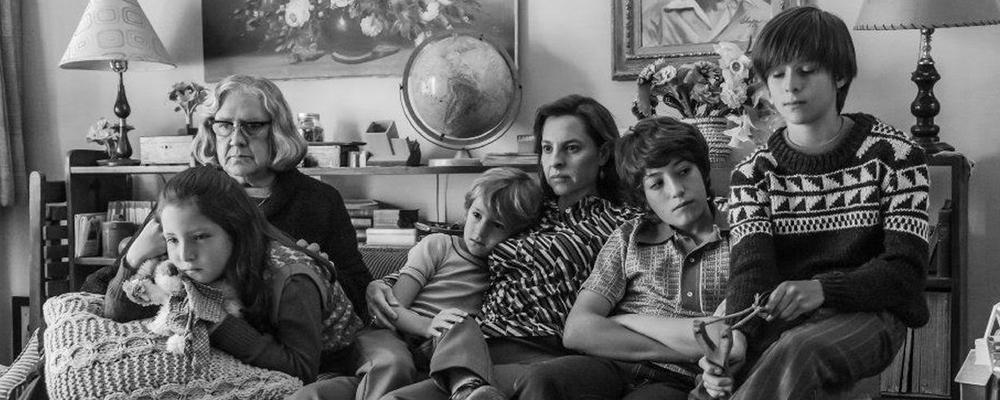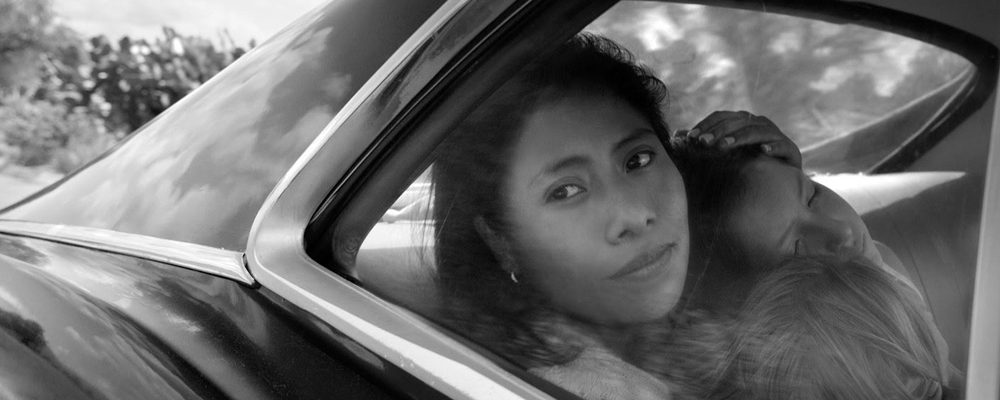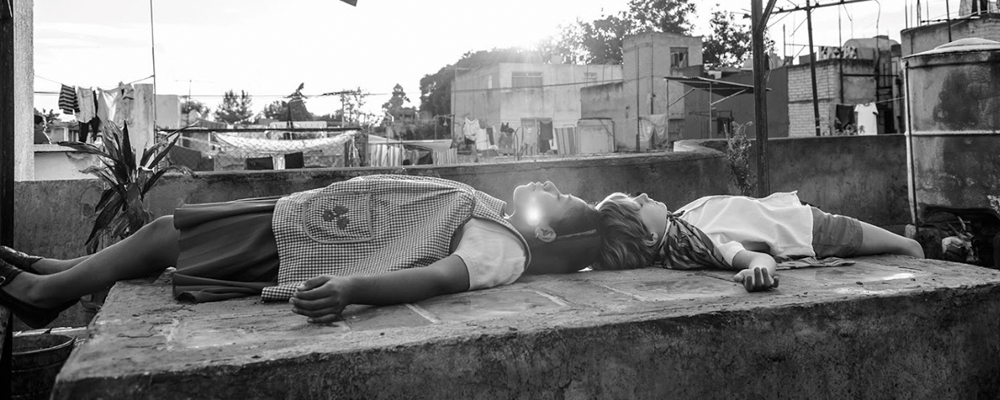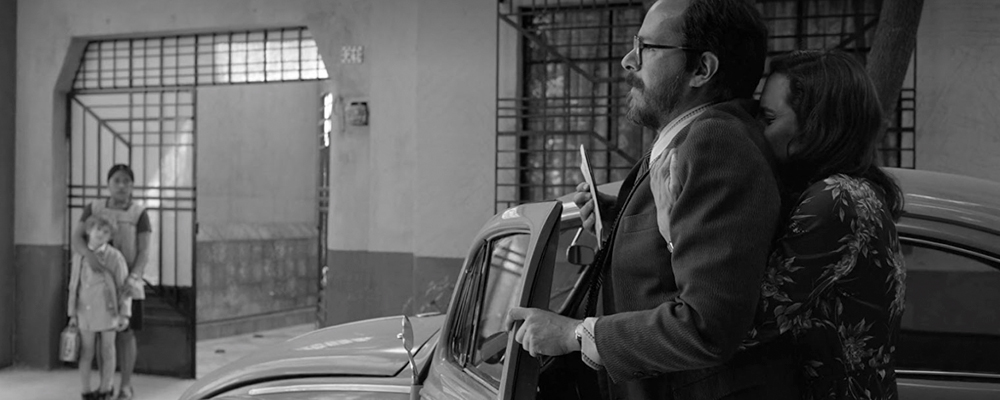Alfonso Cuaron Evokes His Mexico City Childhood in Hypnotically Beautiful ‘Roma’
Alci Rengifo
Alfonso Cuaron wants to use the very essence of cinema to recover the past in “Roma.” His first feature film for Netflix is also one of the year’s best — a haunted, detailed, personal rendering of his memories growing up in 1970s Mexico City. It flows precisely like a string of recollections, but Cuaron is so urgent to share what he has lived and seen that every detail must be rendered. This is one of those few films that comes close to capturing the feeling one has when trying to describe how the dripping water sounded, how the air smelled and the night glowed, how that person looked when they were discovered crying on the balcony.
We are taken into a middle class home in Mexico City. It is the 1970s during the administration of Luis Echeverria. But the film’s gaze is from the point of view of Cleo (Yalitza Aparicio), the serene domestic servant of the home’s family. The de facto head of the house is Sofia (Marina de Tavira), who is raising a family of rowdy three boys and one girl. Her husband, Antonio (Fernando Grediaga), is a doctor who drives home at night in a wide Ford Galaxy almost too big for the house’s garage. He also has a tendency of disappearing for days, to conferences Sofia insists to the kids. It is obvious the marriage is beginning to crack. As life attempts to carry on at a normal pace, Cleo is living her own dual existence. She hails from the poorer, indigenous sector of Mexican society, speaking in her indigenous language to Adela (Nancy García García), the other maid. But as Antonio is gone more and more, the world of this home will slowly begin to alter and painful truths will have to be shared. When Cleo meets a brash, young guy named Fermin (Jorge Antonio Guerrero), she soon finds her own life irrevocably changed as well.
For Alfonso Cuaron “Roma” marks the culmination of everything he has worked towards in nearly two decades of making films. Every technique he has honed in movies like “Great Expectations,” “Y Tu Mama Tambien,” “Children of Men” and “Gravity” flower into stunning perfection in this canvas of wondrous, cinematic rapture. This is one of the great biographical films, breathing in every frame with the sense of something seen and lived. Cuaron opens with the flow of water over a tiled floor, holding the shot, allowing us to appreciate the detail of something as typical as mopping. Little details like this enrich the film’s environment, as when Cleo works in the yard and we catch the glimpse of an airplane flying above, or the way sunlight glistens off dishes that need to be washed. Cuaron’s usual collaborator, the cinematographer Emmanuel Lubezki, was not available this time around, and so Cuaron is his own cinematographer, stunningly evoking the Mexico City of his childhood with a black and white approach that gives the film the ambiance of a dream. It is a non-grainy black and white, yet it conjures imagery worthy of Italian neorealism or French New Wave in its energy and starkness. There is a breathtaking attention to detail. Notice the tracking shots across Mexico City in the evening, when every corner, every room has activity, like countless lives and stories being lived in the metropolis. Cuaron will then elegantly throw in a detail that advances the narrative. Cleo takes the kids to the movies, they run off, she goes to find them and then, from a theater we catch but a brief glimpse of Antonio walking out with a mistress.
If there is a “plot” to “Roma” it is the way Cleo’s life and that of the family can seem secure one moment, and then life’s hurtles throw sudden changes in their way. Cuaron uses these characters to guide us through the various layers of Mexican society. Sofia and her kids inhabit a middle class world of specific manners and social circles. The family loves Cleo dearly, but she is always relegated to watch developments from afar. When Antonio disappears yet again for Christmas, Sofia takes the kids and Cleo to a remote villa owned by a friend married to an American. This entire section is filmed with a strange and almost hallucinatory tone as a maid shows Cleo a wall where the family’s dead pets are mounted to preserve their memory, the upper class men shoot for sport while making quips about leftist guerrillas, and a nighttime party features “Jesus Christ Superstar” on a record player before a fire breaks out. Cuaron comes from this world, he and other recent Mexican filmmakers like Guillermo Del Toro were bred in the middle and upper class sectors of a Mexico where 70s idealism mingled with fierce Cold War politics. Some shots however, speak to more quiet and painful remembrances, like a moment where Cleo steps out a door and finds Sofia on a balcony in a silent, terrible pain from heartbreak.
When it comes to politics Cuaron is not shy of making bold statements, as in his 2006 dystopian “Children of Men.” Yet what he is showing us is everything in the background and foreground of these memories. The subtly with which he includes the way the social and personal mix is done with a particular finesse that can explode into stunning moments. Cleo sleeps with Fermin, who boasts that he is “training” in martial arts, mastering self-discipline. But when she discovers she is pregnant and goes to find him at a training camp, it becomes clear through a few key shots that Fermin is being trained as a paramilitary. The film’s most stunning and visceral moment, shot with Cuaron’s trademark use of steadicam, comes during an outing with Cleo and Sofia’s mother, the house matriarch Teresa (Verónica García) to find a crib. A riot erupts between leftist protesters and government thugs. Notice how Cuaron keeps the camera behind the store window, to frame the utter chaos and fear of such an eruption. The moment culminates in moments of blood and agony. The real world suddenly clashes with the bourgeoisie comfort of the insolated life that has also been Cleo’s home. The following scene, ending in a hospital delivery room, is one of Cuaron’s greatest, full of such scorching emotion that it becomes truly unforgettable.
“Roma” is Cuaron sharing personal and endearing memories, painful experiences and naked truths with the audience. There is much chatter going on about the film’s release on a Netflix platform, but if a studio like Netflix is allowing filmmakers to produce this kind of work then they should be celebrated for doing so. This is cinema that breathes with life and all its losses and discoveries. It is as enrapturing as a good story, and when it’s over you think about it in the way you remember a dream.
“Roma” releases Nov. 21 in select theaters and Dec. 14 on Netflix.





